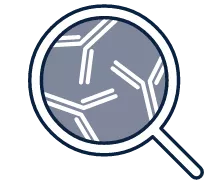Important Safety Information
CONTRAINDICATION:
ELEVIDYS is contraindicated in patients with any deletion in exon 8 and/or exon 9 in the DMD gene.
WARNINGS AND PRECAUTIONS:
Infusion-related Reactions:
- Infusion-related reactions, including hypersensitivity reactions and anaphylaxis, have occurred during or up to several hours following ELEVIDYS administration. Closely monitor patients during administration and for at least 3 hours after the end of infusion. If symptoms of infusion-related reactions occur, slow or stop the infusion and give appropriate treatment. Once symptoms resolve, the infusion may be restarted at a lower rate.
- ELEVIDYS should be administered in a setting where treatment for infusion-related reactions is immediately available.
- Discontinue infusion for anaphylaxis.
Acute Serious Liver Injury:
- Acute serious liver injury has been observed with ELEVIDYS, and administration may result in elevations of liver enzymes (such as GGT, GLDH, ALT, AST) or total bilirubin, typically seen within 8 weeks.
- Patients with preexisting liver impairment, chronic hepatic condition, or acute liver disease (eg, acute hepatic viral infection) may be at higher risk of acute serious liver injury. Postpone ELEVIDYS administration in patients with acute liver disease until resolved or controlled.
- Prior to ELEVIDYS administration, perform liver enzyme test and monitor liver function (clinical exam, GGT, and total bilirubin) weekly for the first 3 months following ELEVIDYS infusion. Continue monitoring if clinically indicated, until results are unremarkable (normal clinical exam, GGT, and total bilirubin levels return to near baseline levels).
- Systemic corticosteroid treatment is recommended for patients before and after ELEVIDYS infusion. Adjust corticosteroid regimen when indicated. If acute serious liver injury is suspected, consultation with a specialist is recommended.
Immune-mediated Myositis:
- In clinical trials, immune-mediated myositis has been observed approximately 1 month following ELEVIDYS infusion in patients with deletion mutations involving exon 8 and/or exon 9 in the DMD gene. Symptoms of severe muscle weakness, including dysphagia, dyspnea, and hypophonia, were observed.
- Limited data are available for ELEVIDYS treatment in patients with mutations in the DMD gene in exons 1 to 17 and/or exons 59 to 71. Patients with deletions in these regions may be at risk for a severe immune-mediated myositis reaction.
- Advise patients to contact a physician immediately if they experience any unexplained increased muscle pain, tenderness, or weakness, including dysphagia, dyspnea, or hypophonia, as these may be symptoms of myositis. Consider additional immunomodulatory treatment (immunosuppressants [eg, calcineurin-inhibitor] in addition to corticosteroids) based on patient’s clinical presentation and medical history if these symptoms occur.
Myocarditis:
- Acute serious myocarditis and troponin-I elevations have been observed following ELEVIDYS infusion in clinical trials.
- If a patient experiences myocarditis, those with pre-existing left ventricle ejection fraction (LVEF) impairment may be at higher risk of adverse outcomes. Monitor troponin-I before ELEVIDYS infusion and weekly for the first month following infusion and continue monitoring if clinically indicated. More frequent monitoring may be warranted in the presence of cardiac symptoms, such as chest pain or shortness of breath.
- Advise patients to contact a physician immediately if they experience cardiac symptoms.
Preexisting Immunity against AAVrh74:
- In AAV-vector based gene therapies, preexisting anti-AAV antibodies may impede transgene expression at desired therapeutic levels. Following treatment with ELEVIDYS, all patients developed anti-AAVrh74 antibodies.
- Perform baseline testing for presence of anti-AAVrh74 total binding antibodies prior to ELEVIDYS administration.
- ELEVIDYS administration is not recommended in patients with elevated anti-AAVrh74 total binding antibody titers greater than or equal to 1:400.
Adverse Reactions:
- The most common adverse reactions (incidence ≥5%) reported in clinical studies were vomiting, nausea, liver injury, pyrexia, and thrombocytopenia.
Report negative side effects of prescription drugs to the FDA. Visit www.fda.gov/medwatch or call 1-800-FDA-1088. You may also report side effects to Sarepta Therapeutics at 1-888-SAREPTA (1-888-727-3782).
Please see full Prescribing Information.



